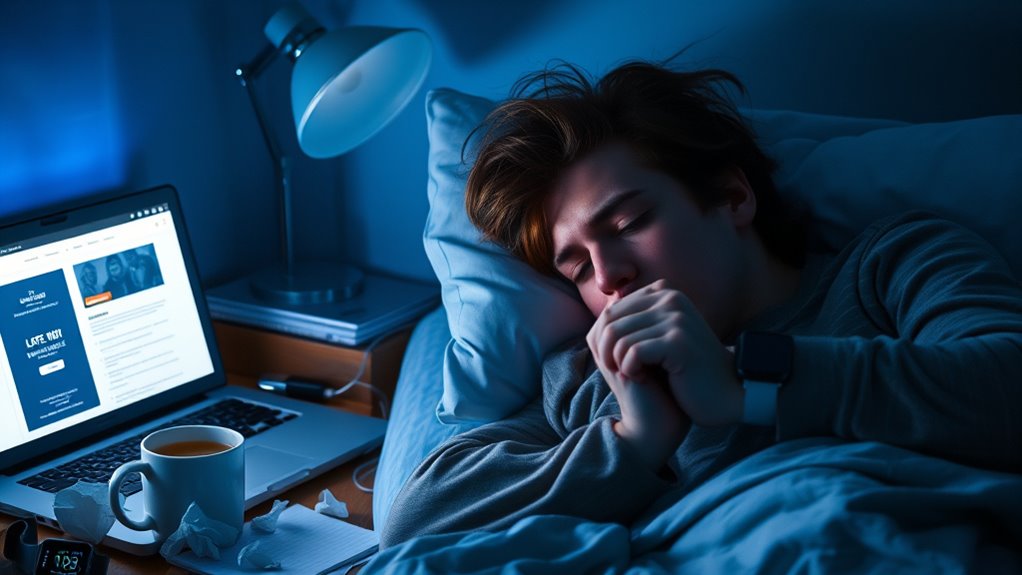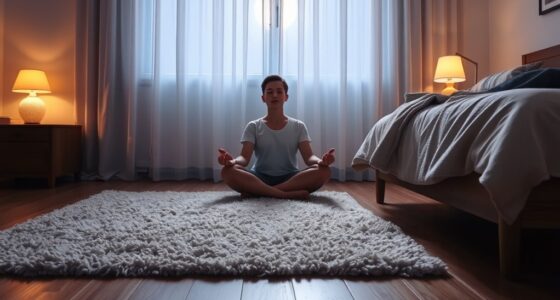To cope with sleep deprivation, establish consistent sleep and wake times, including weekends, and develop calming bedtime routines like reading or a warm bath. Create a dark, cool, and quiet sleep environment, and limit screen time before bed to reduce blue light exposure. Avoid caffeine at least six hours before sleeping and manage stress through relaxation techniques. If problems persist, consulting a healthcare professional can help identify underlying issues and improve your sleep quality. Keep exploring for more effective tips.
Key Takeaways
- Establish a consistent sleep schedule, even on weekends, to regulate your internal clock.
- Create a calming bedtime routine and a sleep-friendly environment that is cool, dark, and quiet.
- Limit caffeine intake at least six hours before bedtime and opt for herbal teas or decaffeinated drinks in the afternoon.
- Manage stress through relaxation techniques and regular physical activity to promote better sleep quality.
- Consult healthcare professionals if sleep issues persist, to identify and treat underlying conditions like sleep apnea or restless leg syndrome.

Have you ever felt exhausted after a restless night? That sluggish, foggy sensation can throw off your entire day, making even simple tasks feel overwhelming. When sleep deprivation becomes a recurring problem, it’s essential to look at your habits, especially your sleep hygiene and caffeine consumption. Sleep hygiene refers to the practices and environmental factors that promote restful sleep. Poor sleep hygiene—like irregular sleep schedules, uncomfortable bedding, or excessive screen time before bed—can considerably contribute to sleep deprivation. To start improving, try to go to bed and wake up at the same time every day, even on weekends. Create a calming bedtime routine that signals to your body it’s time to wind down, like reading a book or taking a warm bath. Make sure your sleeping environment is cool, dark, and quiet, removing distractions that could keep you awake. Limiting screen time before bed is particularly important since the blue light emitted by phones and tablets interferes with melatonin production, making it harder to fall asleep. Additionally, using appropriate Paint Sprayer Zone equipment like filters and tips can help maintain a clean and efficient sleep environment by reducing dust and allergens in your bedroom.
Caffeine consumption plays a critical role in sleep quality, especially if consumed later in the day. Caffeine is a stimulant that blocks adenosine, a chemical in your brain that promotes sleepiness. If you rely on coffee, energy drinks, or even certain teas to get through the day, you might unintentionally sabotage your chances of restful sleep. It’s best to cut off caffeine at least six hours before bedtime to give your body enough time to metabolize it. If you’re craving that afternoon pick-me-up, opt for herbal teas or decaffeinated beverages instead. Being mindful of your caffeine intake not only helps you fall asleep faster but also improves overall sleep quality, reducing the frequency of waking during the night.
In addition to adjusting your habits, consider other strategies such as limiting alcohol intake, engaging in regular physical activity, and managing stress through relaxation techniques. These steps complement good sleep hygiene and mindful caffeine consumption, creating a healthier sleep environment. If you persistently struggle with sleep despite these efforts, consult a healthcare professional to rule out underlying conditions like sleep apnea or restless leg syndrome. Remember, restoring your sleep isn’t just about quantity but also quality. Small changes in your daily routine can have a big impact, helping you wake up feeling more refreshed and energized for the day ahead. Prioritize your sleep, and you’ll find it easier to combat the effects of sleep deprivation over time.
Frequently Asked Questions
Can Napping Fully Replace a Good Night’s Sleep?
Napping, even with power naps, can’t fully replace a good night’s sleep. While short naps boost alertness and improve mood, they don’t provide the deep restorative benefits of overnight sleep. To feel your best, focus on maintaining good sleep hygiene—regular sleep schedules and a calming bedtime routine—so your body gets the quality rest it needs. Naps are helpful, but they shouldn’t replace consistent, quality nighttime sleep.
What Foods Help Improve Sleep Quality?
Certain foods can boost your sleep quality by supporting good sleep hygiene and healthy dietary choices. You should include foods rich in tryptophan, like turkey, nuts, and seeds, which promote serotonin production. Incorporate complex carbs such as oats and whole grains to help you fall asleep faster. Additionally, foods high in magnesium, like spinach and bananas, relax your muscles. Avoid caffeine and heavy meals close to bedtime to improve your sleep quality naturally.
How Does Sleep Deprivation Affect Mental Health Long-Term?
Think of your brain as a delicate clock; sleep deprivation causes its gears to slow, leading to long-term mental health issues. Without enough rest, you risk cognitive decline and emotional instability, making it harder to focus, remember, or regulate emotions. Over time, this damage accumulates, much like rust on a once-precise machine, impairing your mental sharpness and emotional resilience, ultimately affecting your overall well-being.
Are There Natural Supplements to Combat Sleep Loss?
Yes, you can try herbal remedies like valerian root or chamomile to help improve sleep quality naturally. Melatonin supplements are also popular for regulating your sleep-wake cycle. Take these supplements as directed, and remember to maintain good sleep habits alongside. While they can support your efforts, consult a healthcare professional before starting any new supplement, especially if you have underlying health conditions or are taking medications.
How Can Employers Support Employees With Sleep Issues?
You can support employees with sleep issues by implementing workplace accommodations, like flexible schedules or quiet areas for rest. Promoting sleep health programs raises awareness and offers resources for better sleep habits. Encourage open communication so employees feel comfortable discussing their needs. These strategies show you value their well-being, helping them manage sleep challenges and maintain productivity, ultimately creating a healthier, more supportive work environment.
Conclusion
Remember, sometimes your best friend is a gentle reminder to rest. By embracing small moments of calm and listening to your body’s whispers, you can navigate the night’s quiet lullabies more gracefully. Instead of fighting the inevitable, let yourself drift into restful waters when they appear. A little patience goes a long way—think of it as giving your mind a cozy, warm blanket. In time, restful nights will become your trusted companions once again.










